Think! Eat! Act! Portland Release
On June 16th at 4pm-6pm EST, Microcosm founder and Aftermass director Joe Biel will be doing a Reddit AMA. Everything is fair game from the book business to making movies to the struggles with life and health that come along the way.
He’ll be answering questions under the Microcosmmm username and we’ll post up the official info and link when they become available. Get your questions ready!
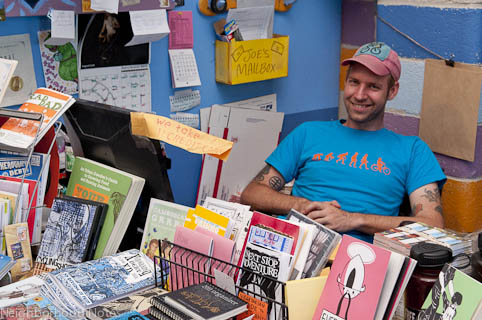
And an update on the recent history of Microcosm…
One Reporter’s Opinion
Several people have asked for an update on all of the confusing developments at Microcosm since we published our You Can Work Any 100 Hours Per Week history zine in 2006. The internet, if it’s anything, is a confusing place to get clear and reliable information where you have to navigate innumerable biases, so putting our story out there to be found seemed like a good idea.
On a rainy day in early 2006, I converted Microcosm from traditional top-down management to be managed by a collective. The staff was not pressuring me to do so, but managing other people was stressing me out something fierce and this seemed like a good way to reduce my own stress load while doing what was “right” politically. I had been raised on didactic politics and because we could only pay minimum wage and asked a lot of people, it seemed like a reasonable and fair thing to do. Unfortunately, it immediately created a slew of greater problems. No one had been on board for ten years like I had, so most people weren’t invested in the same way. I was young and unreasonably optimistic. There weren’t good teaching systems, structures, policies, expectations, and clear historical, organizational, and cultural understandings in place for what people were expected to do. And that was partly my fault.We were constantly negotiating everyone’s feelings. Whoever had the strongest personality would determine management policies by simply being the loudest voice, imposing their views on others.
After being involved in the many various incarnations of Microcosm over the past nineteen years, my tastes and interests changed and sometimes weren’t in sync with the scene’s, the Microcosm collective’s, the organization itself, or the sort of cultural groupthink that was happening around us. One major problem of creating something as a teenager without much forethought is that we were progressively aging out of the youth culture that our fans existed in; the organization couldn’t evolve as fast as it needed to for my own interest. So at various points where I felt particularly out of sync, I would disinvest from Microcosm and try to give other people more room in their vision of how to shape it.
A staff person would say “why don’t we publish this book?” and when we did it was a break from the intentionality of a clear and planned flow of releases and we’d increasingly end up with a storage room full of various unsold books, a problem we’d never had before. Many people came in with different understandings of what Microcosm was and with their own ideas about how it should change, which led to a sort of internal “reinventing” and personality clashes every year or more. I was frequently having to reject submissions that I knew would sell because of the way the conversation had gone within management. Several authors expressed to me that they were told by virtually all members of the collective, “I really liked it but the collective didn’t, so I’m afraid we’re going to have to pass.” I know how rejection feels but this made us look both disorganized and impersonal, and it made it appear like a political rejection or to feel like you were kicked out of the cool kids’ club.
Also starting in 2006, before the bulk of our warehousing was handled by Independent Publisher’s Group, Microcosm set out on an ongoing quest to find affordable warehousing for the volume of publishing it was doing inside inner-Portland. Unable to do so, we instead setup a mail-order and warehouse location in Bloomington, IN in March 2007. This confused a lot of people, who felt that we had “moved out of Portland” even though we still had people and a presence there. Nonetheless, I think people took it as the first “betrayal.” Our fans felt ownership over Microcosm, which made hard decisions even more difficult. Other staff, who interpreted this as a free invitation to move wherever they wanted and keep their jobs, setup an office for promotions in Lansing, Kansas in 2011. Further, due to complications of communication and managing across state lines, all three locations become somewhat fractured from each other and developed tension. Conversations about the simplest things became overly complicated. The overworked staff were frustrated with each other due to distance and perception.The decisions that management was making were causing wages to sink lower each year.
Because we had multiple locations with multiple offices in multiple states, the loudest personalities could still determine management policies by simply refusing to back down.Despite being supposed equals, people were having frequent miscommunications across state lines and attempts at speaking up about this was increasingly futile, even as things moved into absurdity. One person spent their healthcare stipend on a carton of cigarettes. Staff who weren’t working in the same office with the loudest personalities frequently expressed feeling dictated to and managed.
Simultaneously, there was understandable friction that I got the credit when we did something right, even if I had little to do with it. People wanted to interview me, rather than the collective. So there were increasing efforts to make it appear like more of a semi-anonymous group that projected an amorphous image. And I think to the public, it created a lot of confusion because we didn’t seem to act consistently or with forethought. Instead of pursuing a vision we were following watered-down decision making: Actions were taken once a decision was shaped to no longer be objectionable to any member of the collective, rather than making planned out choices set out to achieve specific goals.
Within three years of this, we had bankrupted our savings and trudged along on my personal credit cards with people coming and going fast enough that few managers/collective members really understood the gravity of the situation and thought that we always existed in crisis. And everyone has their own weird little unresolved personality issues to play out that they hadn’t quite shed, including me.
Simultaneously, my ex-wife, who had also been an employee until she quit in October of 2006, accused me very publicly of abusing her in our relationship that ended in 2004, in a moment culminated by me being a jerk about spilling ice cream on our couch, having trouble with her drinking habits while I was needing to quit, and a large backlog of self-described “little things.” By being vague and using terms like “emotional abuse,” there was further confusion about what actually went on in our relationship and people related it to the worst things that they had suffered, tending to assume I was responsible for things like physical violence or rape. While I think her pain was real, I’ve done everything that was asked of me to resolve the situation, and have acknowledged that many times over. Rumors and misinformation about what was said or asked of me, and how I had cooperated or not, literally ripped apart the scene. And it spiraled out of control, making everyone involved crazier in the end, and not seeming to make anyone feel better.
I did respond to and comply with 20 demands made of me and, as requested, found “professional counseling (with someone who is not your friend) to deal with your past family issues as well as issues of control, abuse, and manipulation.” I spent four years in therapy, twice per week, at the request of my ex because a student therapist suggested our relationship might have been abusive. Over the course of those years in therapy, evaluating my behaviors and unpacking the baggage of the history of my life, I had a very good experience of resolving a lot of old things, some I wasn’t aware of and somethat had long been plaguing me, about ways I was raised and treated. It was, overall, a very good experience for me and I’m glad that I did it, even though it did not lead to resolution with my ex. But the real shocker was that after all that time, my therapist told me that while she did not feel that I had an abusive personality, I did have demonstrated issues with understanding people’s expressed boundaries, which ended up revealing much bigger revelations about my brain neurology that had not been noticed as a child. It was a major revelation in my life and the key to understanding so many mysterious and painful events of my past.
As requested, I made a public statement and apology in June of 2009 and several follow-ups to it. Also as requested, the collective made individual statements to Cindy Crabb in 2010 and two group statements in 2011. Further, I engaged with Cindy in an effort to create healing in what is called an accountability process, but lacking proper norms, expectations, and structures for how they are conducted, and having very low success rates, this particular one was further derailed due to being performed completely through a series of interstate emails. This kind of communication was not very suited for demonstrating understanding of complex subjects and creating the kind of emotional proximity and trust that would be required for something like this to work.
Mediation was further attempted by other individuals but once people saw that the situation was complex and not just black and white, they would back away and say they didn’t have time to deal with it, creating more chaos and rumors. Unfortunately, the vast majority of questions from people following the situation have been bullying, yelled, insulting, and assumptive.They began to destroy our morale. It’s been nearly eleven years since my ex and I separated, but to each person who learns about the situation, it’s like an open wound festering with each new rumor and attempt to resolve the situation.
I grew up with a lot of “scene damage” and so when a dozen people I trusted and cared about—albeit most of them knowing little about the specifics of the situation—begin to make demands of me and tell me that contrary to professional opinions, that I am “an abuser” and that my therapist is “not a feminist” when she tells me otherwise, I began to believe it all. Fortunately, around the same time I came to develop a social circle of adults who weren’t involved in the scene and began asking me questions about it and helping to approach the situation in an objective manner. Instead of condemning me, these questions began to help me understand the situation and the way a didactic approach and a mob mentality does not move towards healing. (http://towardfreedom.com/29-archives/activism/3455-the-politics-of-denunciation)
I began to understand the most complicated nuances of all: A person could experience abuse based on their life experiences and how they had been treated before in damaging ways. A person could experience abuse from someone who happened to hit upon their insecurities, however well-meaning. Two people that communicate very poorly could simulate the dynamics of an abusive relationship by failing to understand each other’s statements, motives, feelings, and needs. And the building resentment, hurt, and pain is all very real—intentional or not. And no imposed demands serve to actually heal anyone’s feelings. It just creates more hurt and room for misunderstanding.
Many years ago, I had been involved in the accountability processes of other people and the dynamics that frustrated me so much through other people’s processes are now crystal clear: There is no path towards resolution. As each thing was completed that was asked of me, my friends, my partner, my business, my co-workers, etc, more and more things were simply asked for, and when I asked about clarity, I was told that I should not expect the process or cooperation to resolve the problem, that that was not other people’s agenda or responsibility. And fair enough, but that should have been communicated in the first place and how does a person and a community move forward from such a scar if that isn’t part of the plan and agenda? And that seems to be why people seem to “give up” and splinter off into a different vacuum as an accountability process inevitably fails to comfort people and create resolution.
Feeling unsuccessful, the same public eventually took a new tactic of trying to put pressure on my co-workers to make me do unspecified things or at least kick me out of the collective. That threw the people at Microcosm into a new flurry to “prove” that they did take these issues seriously. Why it was assumed that they didn’t take these issues seriously already, I’ll never know. They did each thing that was asked of them but yet the meme was repeated that they did not and were, in fact, supportive of abuse. And aside from these being some of the people I care about most in the world, the situation was very upsetting because the staff was bending over backwards to cooperate at a time when they were needed to work more and more hours and manage more and more stress and mess.
Simultaneously, my experience and vision could be frustrating and intimidating to people at work who had less of either and desperately wanted to be equals or simply had incompatible visions with the other staff. The whole thing was stressing us all out something fierce.From all points, the staff was really burnt out on it and our fans were bringing the conflict they perceived up to the staff—mostly Jessie—for so many years that it just caused the staff shut to down for awhile. I was fed up and began my exit strategy.
We had very tense all staff meetings in Bloomington in 2009 and 2010 where the entire staff was on the verge of throwing in the towel. Afterwards, several people did quit and others lost their collective status due to working insufficient hours or because of repeated policy violations. I took a leave of absence from management in 2010 to give people some space, get some stress relief, let people direct the future of the organization, and work on a new feature film, Aftermass: Bicycling in a Post-Critical Mass Portland. But I was deeply intertwined, the organization was still lacking cashflow so it was being run on my personal credit cards, and dissolving the relationship wasn’t so simple as walking away. Operations seemed to be getting increasingly disorganized and the mail-order was painfully behind.
Lansing-manager Jessie Duke, a Microcosm employee since 2005, was the first person to take up the option to purchase company ownership as a way to appease the critics in 2010. She began running the whole company in 2011 and her and I created an agreement that she would buy out my remaining 50% ownership in 2012. But in the meantime other staffers began insisting that ownership should have no value and she got cold feet about the risk. She has two small children and things had slowly been going downhill since she started (financially, morale, size of staff, etc).
Trying to find a good solution and finding herself as one of three remaining collective managers, Jessie made the decision to close the Bloomington location completely in July of 2011 and move those operations to Lansing, KS. She also unceremoniously fired Sparky Taylor, who created further public outcry, complaining about our organizational culture. These criticisms were founded reasonably on being worked hard for low pay. Expectations and feelings became the commodities that the staff dealt in instead, creating tremendous ups and downs, but mostly disappointments. Eventually Jessie streamlined the mail-order, with the idea that others would buy out the rest of my ownership and figure out a way to develop their own line of credit. I continued to disinvest.
I created a new press called Cantankerous and started having successes with things outside of Microcosm, which was certainly a wake-up call. We built a touring package that I’m really proud of with my partner Elly Blue and chef Joshua Ploeg (www.dinnerandbikes.com) where we go to your town, Joshua makes seven courses for everyone, and we have movies and presentations about cycling that teach you things like how cyclists pay more than their share of road taxes while motorists pay about 1/11 of their cost to society. It was one of the most successful tours we had done so we kept doing it as I continually disinvested from Microcosm.
Microcosm couldn’t afford its staff anymore so when people quit they couldn’t be replaced and everyone was simply doing more work. I was casually working part time and had removed myself from collective management. I think at some point management just stopped happening and everyone just kept doing their jobs, to their individual level of commitment. Things were falling apart at the seams. Jessie told me that she was having a second son and could not stomach the risk of buying out the remainder of my ownership herself. Other staff felt that funding the launch of the company and growing and running it for the first ten years had no monetary value and that I should walk away with nothing from it.
By 2012, when I came back from two years of managerial leave, the traumatic events were eight years behind me, I had cooperated with accountability, was doing or had finished the 20 things asked of me, and completed my massive soul searching mission, had been in a happy and healthy relationship for four years, and I was just happy to have a personal life again where I wasn’t continually being asked about my private relationships.
We were still based in two different offices in Portland and Kansas and I had proposed splitting Publishing + Distribution into two autonomous organizations back in our meeting in 2010 just before I took a leave. But the collective turned down the notion. Jessie picked up this idea again in June of 2012 and suggested that since no one else was interested in ownership and rather than her taking the continued risk of buying out the remaining ownership, we could literally split into two separate organizations and work internally in our own offices with our own management. It was something I had long dismissed as outside of the realm of possibility: A solution that left the entire remaining staff happy.
In August 2012, the organization split into two separate organizations.
The collective had managed the organization from 2006-2012 but it clearly wasn’t working. We spent the next two years paying off tens of thousands of dollars in debts created by the collective management. To prevent the cycle of further intense feelings of burn out and frustration, I made an immediate effort to work towards doubling wages and looking long and hard at our finances on how to get things back on track. Microcosm continues to operate like a non-profit, dividing all money beyond production expenses into the wages of all staff and by April 2015 the entire staff’s wages will be doubled from what they were in January of 2013. We had a major organizational re-founding, creating a culture of conflict resolution and acceptance. Being aware of and sensitive to what was going on in the staff’s lives became much easier once everyone was working under the same roof and communicating. The emotional landscape gradually relaxed and people’s morale spiked and they did their jobs with a hungry fervor once again. Our visions can push us to where we each want to go and not have to get approval from half a dozen people of various levels of investment.
I’m embarrassed about plenty of things that I’ve done and regret plenty more, but I would recommend years of intensive therapy to anyone who hasn’t done it. It is like magic to walk through your life without carrying around decades of baggage and make conscious decisions for yourself without voices of doubt guiding you. As a result, since February of 2009, I’ve been in what my partner (whom has repeatedly expressed that she finds nothing resembling anything like what I’ve been accused of present in our life now) and I both describe as a happy and healthy relationship. The Microcosm staff has gone through a major culture change and morale boost. People express their problems or concerns and they are resolved.
I still make mistakes and do or say things that come across as callous, but I feel like it’s been reduced by 95% and I found a balance that isn’t totally crippling to my functionality. At work now, the vast majority of our staff are purposefully people who are not neurotypical. This is for two reasons: One, I communicate best with people like this and relate much better with them without long, involved conversations. Two, these are the kinds of people who, like me, have a hard time navigating communication with most people and it causes a lot of pain that we can avoid by clustering together. And also, it breeds trust because they can relate to the experience of being afraid of hurting someone else through accidentally saying something hurtful and so trust goes both ways. It’s easier to have empathy.
But Microcosm ran into one more hurdle. In return for getting half of the inventory, a website, and rights to sell the stuff that we get shipped ready-made from the publisher, Jessie Duke’s new company, Pioneers Press became responsible for half of the current debt load for June and July of 2012 that wasn’t paid for by cash flow during those months. So, in return for roughly $20,000, she received equipment and inventory worth over $100,000. She had been running the company for the last few years, had a good handle on it, and had significantly taken and suggested pay cuts to pay off old debt, which she finished paying off in June of 2012. So it was only current debt that needed paid off.
Unfortunately, despite having a new title by our bestselling author, those two months were terrible for sales. We were sent an “Open Letter to Microcosm” that wasn’t based in fact for either of us at the time and while well-intentioned, wasn’t written by anyone who had any kind of direct contact or experience with any of us. It hurt sales when we were desperately trying to pay off debts and then when she launched her own company, she had a hard time starting out. Further, the staff that was moving to form Pioneers were focused on their new job duties while there was still work needed for the transition by raising the necessary funds. Jessie was still getting a lot of criticism for having worked closely with me for many years and I think people saw it as an opportunity to demand that she take a stand publicly against me, now that she had given me back management of Microcosm. Our fans were frustrated and confused with a high volume of seemingly mixed messages that had come from the collective. The staff of Pioneers, while working at and running Microcosm, had issued a series of statements and promises that the public did not feel were carried out to their satisfaction.
People were really attacking Jessie in public and she has a really hard time with that. I tried to be supportive, but she was not paying anything on the debts she had committed to pay off that were on my personal credit card. And within six months it went from “Sorry, I can’t afford it this month” to “I’m not going to pay you.” She had been very supportive of me for years through the worst times of my life and it really hurt when she sent me the “I can’t do this anymore” message. Ugh. I was patient for 18 months but it was wrecking Microcosm. I had to get second and third jobs to keep the credit card bills under control. She was callous about it and was clearly upset. I hope it was something more than the money because that’s more heartbreaking, you know?
Seriously struggling to cover the same huge credit card bills with half of much money coming in,we asked if they could pay at least $100/month, so we could at least see motion on it, and they refused. More than anything, it was frustrating that our friends had left us in a lurch. Fifteen months later, we reluctantly filed a lawsuit against our former co-workers who still owe Microcosm tens of thousands of dollars. (https://microcosmpublishing.com/blogifesto/2013/11/microcosm-publishing-microcosm-distribution-and-pioneers-press-1)
One of the few comforts of the legal system, unlike the radical community, is that it gets the facts on the table and involves a fact-checking process. When I’ve mentioned how the “accountability group” approached my situation with intense bias, spent their effort yelling at people who were trying to help, and had agreements that they did not disclose to me, I was told that I don’t have a right to fairness or restorative justice. That conservative attitude makes the legal system seem downright radical in comparison. But we’ve found that it’s also very slow, very expensive, and not designed to benefit people in situations like ours. How does one resolve a situation where they are owed five figures? We may never know and there may be no good answer.
There is a culture of fear and didactic politics around the left’s still largely undefined “accountability” practices. Our communities don’t know how to conduct them, let alone how to heal and move on afterwards. That is why Microcosm has made continual efforts to publish works about how to identify and develop healthy relationships, as well as navigating a continued investment to producing resources that help people to understand and negotiate power structures and conflict resolution, to reduce the continual application of sandpaper on everyone’s wounds. Our story has no shortage of tumult and I’ve certainly done things I regret, but it’s promising and exciting that we are in a position where we can move forward and offer insight and resources based on our experiences to help others.

As a result of the mining legacy of the Gogebic Range (Northern Wisconsin and the western end of Michigan’s upper peninsula, two great railroad lines were built to haul out iron ore out of the region. And since the surrounding towns were built before cars took over the landscape, our downtowns, neighborhoods and schools are all located within an easy walk from the railroads. Now, these abandoned rail lines run right through the center of five cities on the Gogebic Range. And having two rail lines eliminates any argument about whether they will be converted for use by bicycles and pedestrians or motorized vehicles. Even so, despite these near-perfect conditions, many efforts to build a bike trail along this corridor were unsuccessful. Objections centered on the question, “why spend money on bike trails with all those pot-holes that need filling?”
In the beginning, the rationale for the trail system was generally recreational or related to tourism. Then we learned that more and more young people were looking for a place to live where they can have a high quality of life, rather than finding the best job. So we focused on the need to attract and retain young workers. And then the major employers in town got excited. Similar to what happened in Houston, TX, they understood that in order to attract young people who wanted to live nearby and work for them, they needed to create an attractive environment. They focused on building a stronger community and developing a network of regional bike trails. With their support, credibility, name recognition and connections, we jumped the hurdle and started to build traction for this long-held dream. Every single municipality, chamber of commerce and school district along the proposed sixteen mile trail passed resolutions of support for the trail’s vision. Now we have $1.2 million in place to build trailheads and the first phase of the trail, including the retrofit of a historic train trestle over the river separating Wisconsin and Michigan. And another million dollars of grant funding for phase II is going out the door as we speak.
Bikenomics is right, by demonstrating the economic justification for bike trails, it is much easier for the community to support, and even demand action on the project. For us the justification was attracting and retaining young people to build a workforce for our local employers, for others it may be some other economic angle.
If you’re interested, here is some more information on the Gogebic Range Next Generation Initiative to attract and retain young people.
As Microcosm enters our 19th year, we hear nothing but doom and gloom about the publishing industry, but 2013 was our best year since 2006. Through business savvy and hard work, we paid off our old debts, re-instituted raises and a year-end bonus for our staff, published twenty new titles, and moved into a new, larger office that we are working towards owning. And we did all of this without a single book selling over 5,000 copies.

Publishing is like gambling. And just the same there are things you can do for a better bet. But in the end it’s still a gamble. In the past we’ve relied upon a single title to sell over 10,000 each year and if one does not emerge, we can be sunk. Having a positive relationship with the right printer, 350 books that each give us a steady trickle year after year, constantly re-checking the math on our spreadsheets, keeping track of who is buying our work and what kinds of things they like best, working with great self-promoters, building relationships with blogs, and putting attention into production, design, and all of the little details has allowed us to be successful on our own terms while having the privilege of avoiding Amazon’s creepy influence on books. Because our background goes back to a seventeen-year-old punk rocker in a bedroom, we have chosen to stay independent of outside financial pressure and influence for over eighteen years and continue to publish twelve to twenty new titles per year.
While some people love to argue with us over whether this is possible or not, we can print each book for between 40 cents and $2, with the vast majority costing 70 cents each. I believe most publishers are looking at the wrong number: The total of the printing invoice rather than the cost per book. This is done through printing between 2,000 and 10,000 copies per printing. Sometimes it’s a careful balance of calculating how many copies of something we could reasonable sell to avoid over printing. But when we do need to reprint, that’s an awesome success!
More like Dischord or Lookout Records than even Soft Skull Press or Seal Press, we have always operated in parallel to the publishing industry. In 2011, a confused Calvin Reid from Publisher’s Weekly exclaimed “Why have I never heard of you?” when we were signing with Independent Publisher’s Group. We had gone fifteen years without a proper trade distributor, because we didn’t need one. Instead, we’ve built our ground game, doing tours through small towns where we set up a pop-up bookstore, having fans pass out our catalogs in far-away cities, appearing at events where we have the only books on site, and building a movement of people who believe in the work and subjects that we promote, like self-empowerment, gender, punk rock, and bicycling.
We still focus 95% of our efforts on print because it is more environmentally responsible, gives us much more freedom in where we are sending our money, and because books like ours just don’t sell in electronic formats. In 2011 they represented 8% of the total market and that shrunk to only 6% of sales in 2012. Despite the hype about this being the future, we’ve been raised to see these as having little or no value and most people are not willing to pay more than $2.99 for an eBook, unless it’s something they’d be embarrassed to read on the bus—“romance,” thriller, murder mystery, throwaway science fiction, or serialized fantasy novel. You could wax philosophy all day about the tangible nature of books, but let’s face it, it’s much harder to build a movement digitally, where you are reliant upon artificially underpriced data flows and major corporations.
While more and more publishers rely upon Amazon or bemoan it’s market dominance, it has little effect on us because we exist in parallel to the industry, rather than inside of it or in opposition to it. People buy our books because of their practical content and value, frequently motivating the reader into action. Because of all of this and our talented pool of authors, we still feel like a little fish, but together we just might be able to make it work!
Read more about Microcosm and the publishing industry in Joe Biel’s book, A People’s Guide to Publishing.

In the name of fiscal transparency, like a 501(c)3 nonprofit, we publish our financial reports each year. You can also read them from 2012, 2011, 2010, and 2009! We’ve worked very hard this year, one of our hardest ever, and we have a lot to show for it. We were able to re-institute a year end bonus for all employees while giving raises and paying off all of our old debts. We feel that we have reached a place of stability with a certain future through the recession and the evolving publishing industry. We moved into a newer, larger building last month that we own. Thanks for all of your support and for sticking with us through our 18th year. All future finances beyond operating expenses will go into upgrading computers, providing raises, and re-instating staff healthcare. If you want to help, the best thing you can do for us is to sign up for a BFF subscription or purchase anything from the site!
2013 Income $304,272.05 (a 15.1% increase)
Expenses
=========
Printing Bills $130,305.69 (54.4% increase, 43.1% of budget)
Total staff wages $67,014.43 (49.3% increase, 22.2% of budget)
Shipping $30,900.62 (21.1% decrease, 10.2% of budget)
Paid to publishers and distributors $23,472.60 (27.3% decrease, 7.8% of budget)
Utilities, insurance, phone, office supplies, etc $16,261.20 (39.1% decrease, 5.4% of budget)
Royalties to authors $15,564.39 (57% increase, 5.2% of budget)
Rent $8,784 (18.4% decrease, 2.9% of budget)
Advertising $5,282.75 (3.2% decrease, 1.7% of budget)
Catalog Printing $2,314.62 (12.3% decrease, .8% of budget)
Travel $2,147 (71.6% increase, .7% of budget)
Staff Healthcare $0 (0% of budget)
Donations $15,325 (1.1% increase)
=================
Total Expenses $302,047.30
Total $2,224.75 (profit)
We used this profit to pay off last year’s losses of $-967.87 and establish a bit of a safety net for the future.
I’m generally not one for year end lists. Usually I’m late to the party. Often times I’m not invited to the party. Sometimes I get lost on my way to the party and end up at a different party, but still have a really good time. With that in mind, this is my list of 2013’s “Top Things Made of Words.” These days format is less relevant than ever, so for this list, everything qualifies. Whether it’s an old book I didn’t read until last month, a blog, a zine, or the post-it that was stuck to my shoe, it all has a chance.
If you’re here, you probably already know the things we publish. And although I’m endlessly excited about each of them, I’ll try to leave them off of here. But no guarantees.
And now, in no particular order…

Scott McClanahan is probably my favorite writer that I discovered in 2013. I’m not the only one, as his most recent book Hill William has been everywhere I look lately. Rightfully so. Scott is from one of those places you forget exist outside of the movies, and are glad you’re not from. He was raised in a collapsed coal town in West Virginia and it serves as the basis of most of his writing. I picked up a short story collection of his, The Collected Works Vol. 1, mostly based on reputation, but partly just because of the cover image. I was sucked in by his perspective as a somewhat sensitive writer and storyteller among anachronistic coal miners, hard working hillbillies, and directionless drunks. Immediately after, I picked up Crapalachia and tore through the tales of his family and childhood friends. Hill William is waiting for me at home and it will be the next book I open.
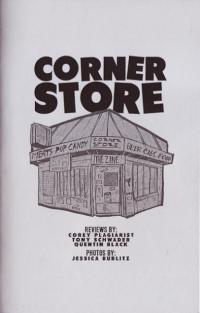
I’ve said a few times in my life that I like movies and books where nothing really happens. A not so eloquent way of expressing appreciation for things that document a specific place or a moment in life. A record of things that don’t belong in the history books and will never be a blockbuster, but capture pieces of culture and emotion. Corner Store does this at its most basic level and it is somehow totally engrossing.
A handful of friends cruise around Milwaukee with one goal and a few basic rules. With a limited amount of money and a few government subsidies, they visit as many neighborhood corner stores as they can find. Not chains, not stores in the middle of the block, and not free standing markets. Just corner stores. They describe the places, poke around the inventory, mention anything of interest, and buy some malt liquor or a pack of peanuts or one of those 99 cent tall cans of sugar juice. Some people like to read books about WWII, or the rise and fall of kingdoms. I like to read about the chip selection of corner stores I’ll probably never visit.
From what I can tell, #2 was actually published sometime in 2012. #1 gives pretty much no indication of date. Both are seemingly hard to find in stock on the internet, but we actually have a couple copies of each in the store if you are dying for one.

Rontel is the pretty little kitty pictured above. Sam Pink is pretty in his own way. He’s also one of the most uniquely voiced and styled writers I’ve read in a long time. His books are generally short collections of poems, stories, phrases, and outbursts. Most of them can be taken in in a single sitting, and I’ve done that with every one of them that I could get my hands on. Rontel, like Corner Store, is also a record of a brief place in time as the author does his best to live and exist in Chicago. Actually, that’s wrong. He’s not doing his best at all. The problem is, he has no idea what his best is. So instead, he wanders aimlessly, half-awake, and a little bit dead, finding the absurdity in his own bleak existence. And he’s really damn good at that.

Lazy Fascist Press published Rontel. They also published Scott McClanahan’s Collected Works. When it comes down to it, pretty much everything they do is weird and wonderful and unique in the world of fiction. Just go read anything you can find that has their little mustache logo on the spine. That’s what I do.

Is 2013 the year “weird twitter” became a thing? Or is that just another party I’m a little late to? Either way, it the year I found the thriving community of writers and weirdos that make Twitter a place for more than just links to articles. Mount Ennui and ornery island are two people (or at least I assume they are) that transcend the running jokes and bad puns of other “weird” accounts and enter a different dimension of single line poetry, interconnected thoughts, and allusions to things you didn’t realize you’ve experienced. 140 character reminders that we all share this spaceship. And that it’s forever sinking.
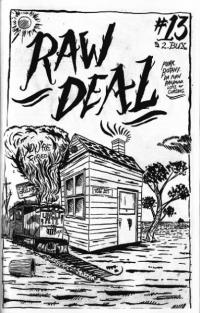
Raw Deal #13 is both one of my favorite zines I’ve recently read, but also one of those most frustrating. Favorite because it’s a dirty (like under your fingernails, not sexy), passionate (same) collection of trains, botany, graffiti, and art through the lens of a punk mindset. From saving rare trees by breeding them in abandoned Oakland lots, to going from trainhopper to legitimate brake man, Joey Alone inspires in all the right ways. Why frustrating? Because this is the only piece of writing by him that I can find. It was formerly called Loitering is Good and I’m assuming there’s 12 other issues out there somewhere, but I’ve never encountered a single one of them. Somebody help!
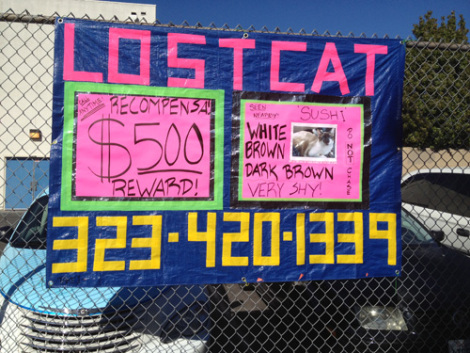
Fancy Notions is the blog of a friend of mine. But regardless of that, it is filled with wonders of lesser traveled highways, old superstitions, liquor store artwork, and creepy childhood memories. Always worth reading.
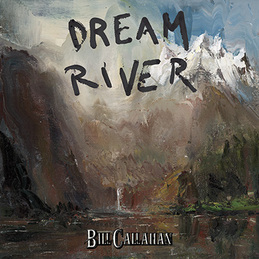
In this case, we’ll ignore the music, but you should never actually do that. Bill Callahan, formerly Smog, has spent decades releasing one great album after another. Of the large chunk of his output that I’ve spent serious time with, I can’t think of a dud. Dream River is his most recent release and continues his style of extremely personal, but concise narratives. My favorite songwriter will probably forever be John Darnielle, but where Darnielle crams a devastating paragraph into a single measure of music, Callahan achieves the same emotional resonance by slurring a single syllable out over a few beats. His words hit you in that corner of the brain that makes your eyes glaze over and hands tense, as you relive your own version of the scene he’s spelling out.

A friend of mine may have said it best when, after I made him read this, he said something along the lines of “This completely convinced me that Radon is my new favorite band before I had ever heard their music.” And it’s true. Fristoe and Cometbus tag team the story of a DIY punk band from Florida that never quite got the attention they deserved. A portrait of a scene, a punk field guide, and just some damn good writing. If you’ve ever felt passionately about a band, you’ll be able to relate.
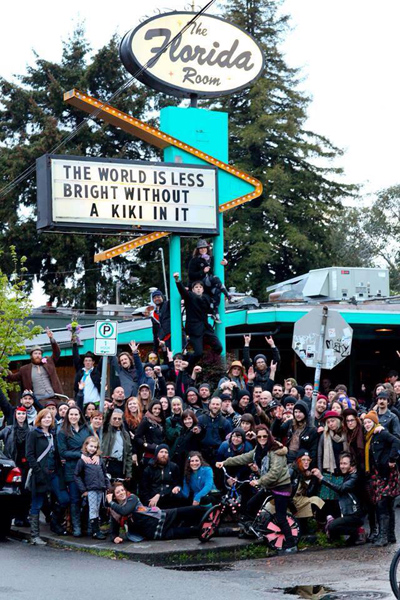
The Florida Room is a bar–good bloody marys, cheap tater tots, and just around the corner from my house. All good reasons to go hang out. But the reason it fits into this list, is the marquee. Like a lot of bars with signs or chalkboards, there’s plenty of silly jokes and advertising, and sometimes it’s amusing to see the dirtier ones in big letters on a fairly busy street. However, it’s also the only bar marquee to ever make me tear up a little. Nobody likes to lose a friend (or even just an acquaintance in my case), but it’s nice to see their name up in lights one last time.
Looking forward, I’m not sure which party I’ll wander into this year, but I’m sure it’ll be something just as engrossing as the 2013 has been. And as for things around here, there’s a whole host of things I’m looking forward to reading. The top of the list right now (which is always changing) is Aftermath of Forever, the next issue of Railroad Semantics, and the newest from Joshua Ploeg, This Ain’t No Picnic. But most of all, thank you for supporting all that we do! It would all be useless without you.
-Tim
December was a busy month for us! Between trips to Chicago, Oklahoma City, Houston, and Fort Worth, we’ve also been moving into our new location! Our store/office/warehouse/life/nucleus of activity is now at 2752 N Williams Ave. Portland, OR 97227!
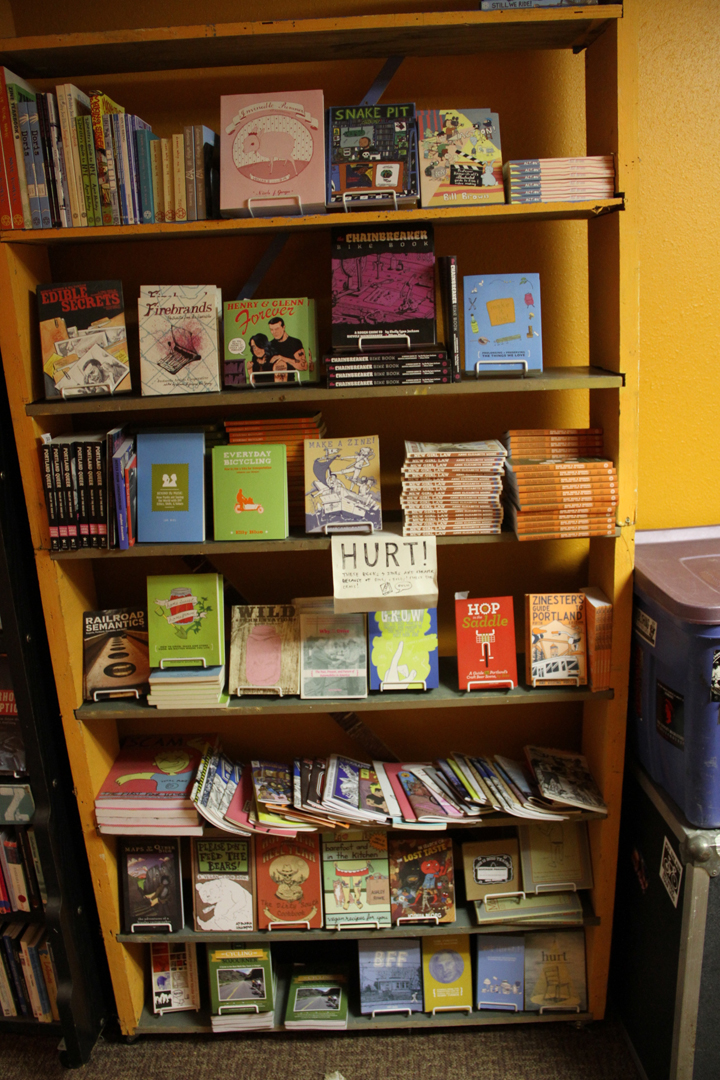

Just so you know, we’ve got a lot of super great new titles! Who’s excited about Railroad Semantics #2!!?

If not that, how bout the new edition of Mostly True!

Raleigh Briggs even released her sequel to Make Your Place, the much-anticipated Make It Last!

Beyond The Music is Joe Biel’s new book, a really great one for anyone interested in the Punk “Scene” or the DIY ethics it brings with it.

And of course, we can’t forget about Everyday Bicycling, Elly Blue’s know-it-all book about cycling in any and every situation, a super great guide to get someone who might just be getting into bicycling, or even the bicycling fanatics! 🙂

Holy Cow! As I was typing this we just got another one in! The People’s Apocalypse! This one looks super interesting!

If your into that whole Thanksgiving thing, these are all things to be thankful for!
If your into that whole Christmas thing, any one of these would make great gifts!
Or, you could gift one to someone on Nov. 13th for World Kindness Day.
You’ll also have to stock up on books to read for Stay At Home Because You Are Well Day at the end of the month. Book Lover’s Day doesn’t have to end on Nov. 4th, it can last all year!
I can’t even keep up around here. I’m going to have to start reading faster…
-Jeff
Hey Folks,
Although some of you may not know, Microcosm Publishing was effectively split into two separate companies on August 1, 2012. This was done for a number of personal, financial, and geographic reasons, and led to the formation of Microcosm Distribution (which has since become Pioneers Press).
Unfortunately, splitting a company in two that has been in existence for over 15 years comes with an endless list of complications. Like a lot of the publishing world, and the world at large, this happened during times that were extremely hard for us. Prior to the split, Microcosm Publishing had amassed nearly $37,000 in debt—an amount that seemed nearly insurmountable for those involved.
As part of the agreement, which was drafted with the input of both parties and executed prior to the split, we agreed to each keep half of the organization’s property and split the debt 50/50. The settling of the debt would be done by Microcosm Distribution making monthly payments to Microcosm Publishing on their half of the debt until it was resolved.
However, despite the agreement, these payments were never made. Microcosm Distribution claimed that they are not responsible for any of the debt amassed while they were a part of the company and its management. We understand that it’s difficult to even survive in the publishing world in its current state, but that does not justify leaving one half of the company with the entirety of the debt.
After 15 months Microcosm Publishing has still not received any of the agreed upon contributions. Thankfully, through new endeavors and pinching paychecks, we’ve managed to scrape together the money to stay in business. At this point, we feel we have no chance at making progress with this issue without the help of professional counsel, and have filed suit against Pioneers Press as a last resort attempt at receiving their fair share of the debt payments.
It’s an unfortunate, and wholly foreign to us, way to go about this, but we can find no other solution. We are simply asking that the signed agreement be honored.
Although personal problems and past relationships can cause issues within business, Microcosm Publishing is an active and growing publisher with a small, full-time staff who are dedicated to creating the books we want to see in the world. And we would love to continue doing just that.
<3
Tim Wheeler
Microcosm Publishing
Anybody ever watch that old movie Night Train to Munich? For some reason every time I get on a tr  ain I expect spies and espionage. The night train from Portland to San Francisco, lovingly called, “The Coast Starlight” has a time schedule based on approximations at best, and aside from the uncouth and suggestive remarks from the café car over the loudspeaker, little to no excitement is what you can expect. But for anyone tenured to the ways of rail transit, I’m sure you could amalgamate a fine story, riddled with excitement from all your Amtrak adventures.
ain I expect spies and espionage. The night train from Portland to San Francisco, lovingly called, “The Coast Starlight” has a time schedule based on approximations at best, and aside from the uncouth and suggestive remarks from the café car over the loudspeaker, little to no excitement is what you can expect. But for anyone tenured to the ways of rail transit, I’m sure you could amalgamate a fine story, riddled with excitement from all your Amtrak adventures.
Last week I journeyed by way of the “Starlight” to the Bay area for the great Alternative Press Expo (APE). I was to be joined by Corbett Redford of the nefarious satirical duo, Bobby Joe Ebola and the Children MacNugget’s, for a two day tabeling event behind a wall of Microcosm! The event took place at the Concourse; this place was, to my guess about the size of two football fields, that’s approximately 116,000 square feet of comics, books, fans, and various collected art from all facets and corners of the imagination.
I arrived a few days early to pound the sidewalks and disseminate the volumes of Microcosm’s gamut to the eager public. Most of this I accomplished on foot, however my friend DJ Freshstep occasioned to scoot me about the city on the back of his Vespa. This was the one, quasi euro transit attack I managed.
Corbett, harnessing his impressive clout, succeeded in shepherding me, during one of my afternoons, though the backdoors of some of the great legendary record and comic shops of the city. The two Amoeba’s, Rasputin, and 1-2-3-4 Go, gave us the royal welcome and what seemed like every comic shop in the city was well enthused to shake the hand of an affiliate of Henry & Glenn.

A who’s who mixer at the opulent office of Last Gasp prefaced the two days of the APE. If you’ve ever wondered what it’d be like to walk around in a Robert Crumb drawing, while glancing through old photographs of William Burroughs gripping his iconic pistol, Last Gasp wont disappoint. It was like a museum but more along the lines of the home of your parent’s awesome hippy friends. Think of the Barthes collection, but superimpose all the bizarreness of the 1960’s drug culture.
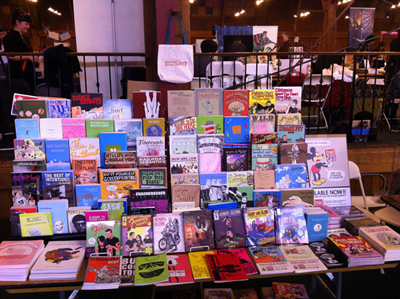
The two days of the APE, Corbett and I huddled, side-by-side behind the great wall of Microcosm titles I created for our display. Corbett was mostly occupied preaching the good word from his newly debuted Microcosm release(s), The Bobby Joe Ebola Song Book, and Meal Deal With the Devil; Signatures were given and reluctantly received! No time to sit and a near 19 hours of collected alternative press left us dizzy and hyper-conscious of the mistake of building a wall, behind which there can be no sitting, less you leave the books to speak for themselves.
APE, see you next year!